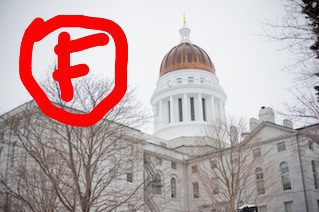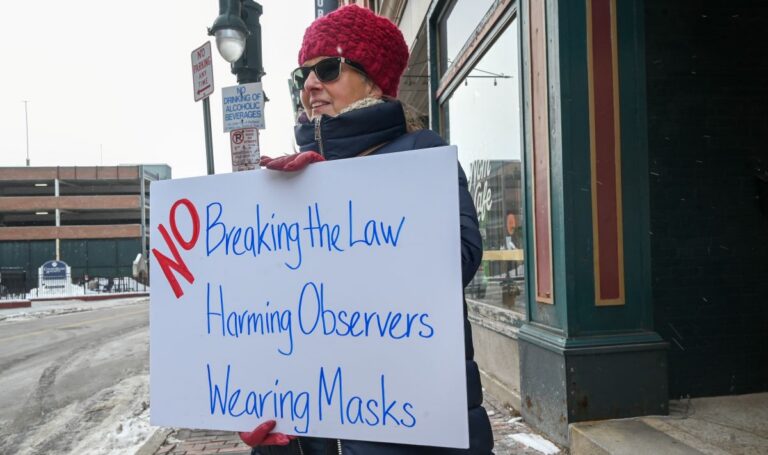When Maine Governor Paul LePage appeared at an impromptu press conference in June bearing a Christmas tree and a miniature rubber pig, it marked a turning point.
LePage had decorated the tree with photos of lawmakers, whom he said had negotiated the state’s two-year budget in secret and then filled it with pet “piggy projects” while no one was looking. He squeaked his rubber pig for dramatic effect.
The controversial governor had a point. Republican and Democratic lawmakers alike had held last-minute negotiations on spending behind closed doors, flouting the spirit, and possibly the letter, of the state’s open meetings law.
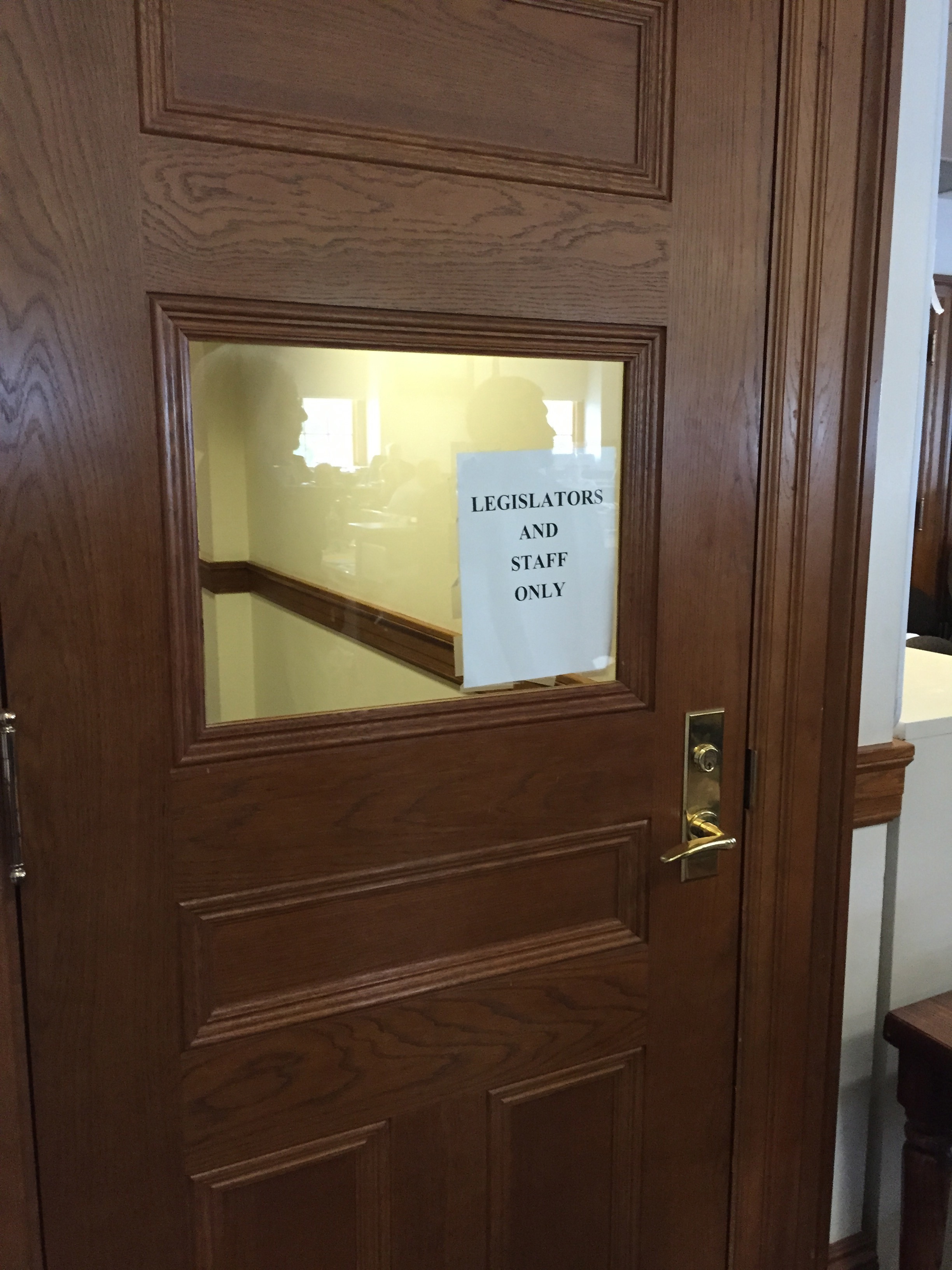
But there were plenty of accusations to go around. Just a few weeks later, protests rocked Augusta when House Speaker Mark Eves, a Democrat and political adversary of the governor, alleged that LePage, a Republican, had threatened to withhold taxpayer dollars from a charter school that had hired Eves as president.
A legislative probe and calls for LePage’s ouster ensued; Eves has filed lawsuits in state and federal courts.
The year’s frenetic events mark a turn towards increasingly incendiary, winner-take-all politics. But the histrionics also underscore a more insidious problem: Maine’s weak accountability and transparency laws aren’t keeping up with the new pace of politics here, and lawmakers are doing little to change course.
This dynamic has earned Maine an F and a numerical score of 59, placing it tied for 42nd among the states in the 2015 State Integrity Investigation, an assessment of state government accountability and transparency conducted by the Center for Public Integrity and Global Integrity.
In 2012, the state also received an F, scoring a 56, for a rank of 46th among the states. The two scores are not directly comparable, however, due to changes made to improve and update the project and methodology, such as eliminating the category for redistricting, a process that generally occurs only once every 10 years.
Trust, not verify
Maine’s part-time “citizen” legislators, many from small towns in New England’s most sparsely populated state, have always prided themselves on working together.
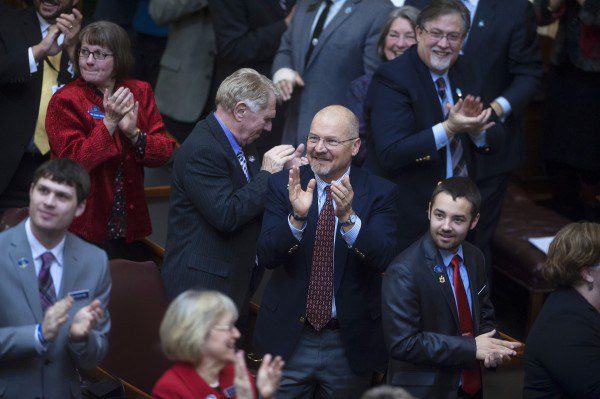
Trust is the mantra here — not verify; a state of affairs that might not have satisfied Ronald Reagan. Management of the state’s $12.7 billion pension fund, for example, ranks 41st nationally in transparency, according to the State Integrity Investigation; it operates with few anti-corruption checks and balances. Oversight of the state’s elections is open to political interference. The judicial and executive branches police themselves. And the Human Rights Commission is woefully understaffed, sometimes leaving whistleblowers in the lurch.
These vulnerabilities, remnants of an era when conciliatory politicians dominated Augusta’s politics, are mirrored throughout state government.
“Everybody knows everybody here,” said Ann Luther, of the Maine League of Women Voters. “When we talk about clamping down on this stuff, it’s not just some distant ‘other.’ It’s people we know. That makes it hard.”
Access to information – when we’re good and ready
Transparency was an early casualty of partisan warfare.
In his first term, Gov. LePage, elected in 2010, expressed concern that the state’s open records act was being abused by political adversaries on “fishing expeditions.” Initially, LePage’s frustration was directed at the Portland Press Herald, until recently owned by billionaire financier S. Donald Sussman, who was then married to U.S. Rep. Chellie Pingree, D-Maine.
But growing antagonism and mutual distrust has led many reporters to lean more heavily on the state’s Freedom of Access Act for information.
As that process unfolded, the law’s loopholes, once considered minor, started to seem more glaring.

In 2013, for example, officials at Maine’s Center for Disease Control and Prevention, in the process of responding to a request from the Sun Journal, destroyed documents describing the state’s decision-making process on millions of dollars in grants. Yet Maine’s open records act was too vague on the question of whether working drafts are public records to press charges, according to a deputy district attorney.
“People just assumed government was doing the right thing, until they found out that they weren’t,” said Judy Meyer, vice president of the Maine Freedom of Information Coalition and managing editor at the Sun Journal.
“It was terrible that it happened, but good that people sat up and paid attention.”
But the law still lacks teeth, she said. Legislation gives public servants free rein to determine “reasonable” response times to requests. Predictably, controversial inquiries sometimes face long delays.
“What’s the punishment if you don’t comply? There is no recourse. The legislature continues to believe we can all get along and make this work through relationship-building,” she said.
Do-it-yourself ethics enforcement
Political rancor has also highlighted major gaps in the legislation governing Maine’s independent ethics enforcement agency — a key component to any state’s anti-corruption infrastructure.
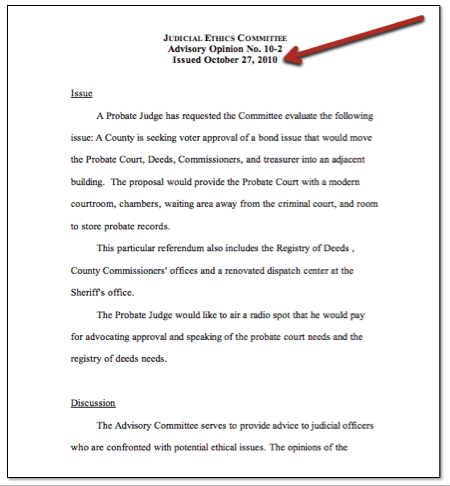
For starters, the Maine Commission on Governmental Ethics and Election Practices oversees only the legislative branch. The judiciary has a commission on ethics, but it has no enforcement power and hasn’t issued an advisory opinion since 2010. And when questions arise about executive branch ethics, there’s simply nowhere to turn for guidance.
“The thinking, among many people, is that agencies have an interest in policing themselves,” said Jonathan Wayne, the commission’s executive director. “Some states have decided you need a separate office to do this, and Maine hasn’t.”
But lacking strong independent oversight, ethics debates are relegated to politicians, pundits and journalists.
In February, for example, LePage took issue with the findings of an investigator for the Human Rights Commission in a discrimination case. He asked that legal proceedings be postponed. The Commission’s director, fearing political interference, said no. Three days later, according to a Maine Center for Public Interest Reporting investigation, agency funding was put on hold.
Was this a breach of ethics? The law is unclear, and no ethics agency exists to pass judgment.
Slap on the wrist
The ethics commission does receive praise from advocacy groups for its oversight of legislative transparency and campaign finance law. But gaps in the laws still hamper its effectiveness.
The commission receives hundreds of income disclosures each year from lawmakers and top officials in the executive branch. But Maine law allows officials to omit key details, like any asset, such as a second home or investment property, that may not generate income that year. And the law doesn’t mandate disclosures be audited.
The results are predictable: key transactions, events and relationships sometimes slip through the cracks.

When corporate giant Time Warner, for example, invited 22 Maine legislators to talk Internet speeds at a fancy dinner and spend the night at a handsome coastal resort, lawmakers didn’t utter a word. Steak was on the menu, but since the event was part of what one Maine official called an “informal presentation,” the law says no legislative disclosure is required, a Maine Center for Public Interest Reporting examination revealed. And ocean-view hotel rooms, no matter how swanky, aren’t considered by the law to be gifts if they’re worth under $300.
Even when the law does apply, the commission’s meager penalties don’t amount much of a deterrent. In 2014, the National Organization for Marriage, for example was fined $50,000, just 2.5 percent of the $2 million in contributions it failed to disclose in a 2009 bid to overturn a Maine law legalizing gay marriage.
“Political operatives see the fines as the cost of doing business in Maine,” said Andrew Bossie, executive director of Maine Citizens for Clean Elections.
One step forward, two steps back
For reformers, the good news is that the high-profile scandals of the past few years have begun to increase calls to beef up accountability.
New laws passed in 2013, for example, bar legislators and top executive branch officials from lobbying their former colleagues for one year after they leave office. Legislators this year earmarked funds to make disclosure data filed with the ethics commission more accessible to the public. And last week, Maine voters passed a referendum to bolster transparency and increases fines for campaign finance law violations.
Yet the wheels of government still grind slowly in Maine. Legislators, backed by the governor, recently killed a reform bill that would have barred lawmakers from paying family members with money from political action committees. And legislation to establish a code of ethics for civil servants failed to receive funding during last-minute budget negotiations.
These rejections of proposed reform measures provided a not-so-quaint reminder that money and politics still call many of the shots when it comes to ethics in Maine.
This story is from the Center for Public Integrity, a nonprofit, nonpartisan investigative news organization in Washington, D.C. It is part of State Integrity 2015. How do each state’s laws and practices deter corruption, promote transparency and enforce accountability? Click here to read more stories in this investigation.


